Travel ban was on, then off. Now it’s back, but different

President Donald Trump‘s first, temporary ban on travelers from seven majority-Muslim nations was short-lived, but it sparked confusion, panic and anger that lasted through months of court rulings. The Supreme Court is now taking up the case in the fall. In the meantime, the government can enforce parts of a second version of Trump’s order. So what’s new this time? — BANNED FOREIGNERS Old order: Three-month ban on citizens from seven Muslim-majority countries, including those who had valid visas but were outside the United States when the ban was signed. Supreme Court version: Iraq has been dropped from the ban. For 90 days, the government can bar new visa applicants from Syria, Sudan, Somalia, Yemen, Iran and Libya who can’t prove they have a “bona fide relationship” with close relatives or a business in the United States. The State Department says valid relationships include a parent, spouse, fiancé, child, adult son or daughter, son-in-law, daughter-in-law, sibling already in the United States. Journalists, students, workers or lecturers who have valid, formal invitations or employment contracts in the U.S. will also be welcome. Refugees hoping to come to the United States who aren’t already approved for travel must now also prove one of these relationships. Otherwise, they’ll be barred for 120 days. — SYRIANS Old order: Syrian visitors, immigrants and refugees were barred from the United States indefinitely. Supreme Court version: Syrians will be treated in the same manner as citizens of the other five designated countries. — REFUGEES Old order: Four-month halt to refugees entering the United States. Supreme Court version: The refugee ban will be in place for 120 days. But refugees already vetted and approved for travel through July 6 will be allowed to move to the United States. The “bona fide relationship” standard applies after a cap of 50,000 refugees that Trump set for the fiscal year is met. That is likely to happen soon. The new rules will likely affect refugees in the next fiscal year, which starts in October. The Supreme Court will hold a hearing on the ban that same month. — TIMING Old order: The Jan. 27 order was immediately put into place, causing chaos and panic at airports as the Homeland Security Department scrambled to figure out who was covered by the order and how it was to be implemented. Supreme Court version: It went into effect at roughly 8 p.m. Eastern time Thursday, more than 72 hours after the Supreme Court issued its opinion. Republished with permission of The Associated Press.
Donald Trump travel ban partly reinstated; fall court arguments set
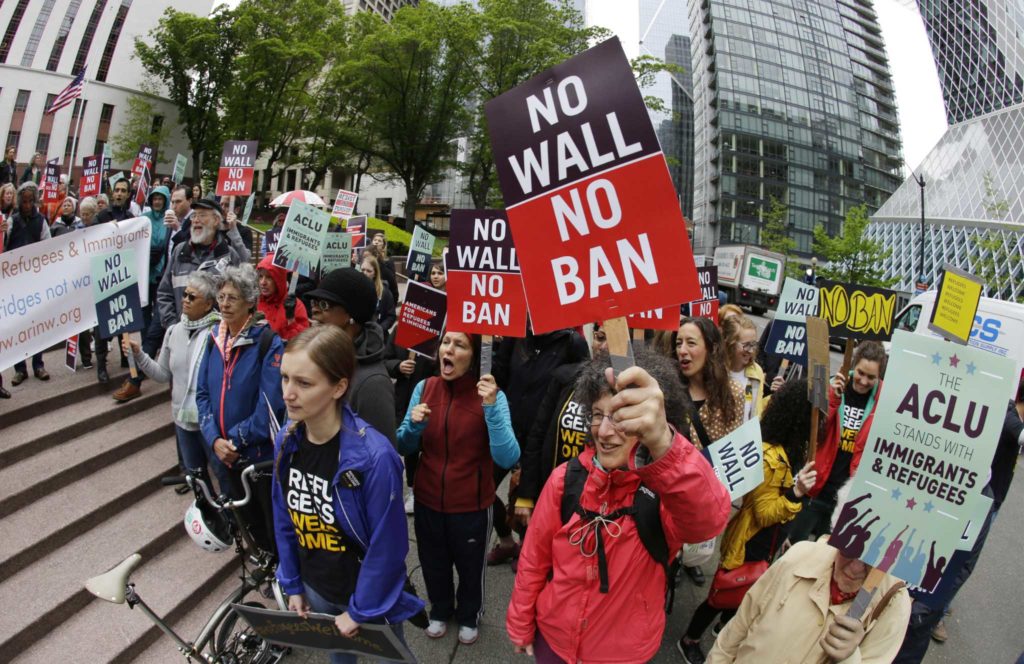
The Supreme Court is letting a limited version of President Donald Trump’s ban on travel from six mostly Muslim countries take effect, a victory for Trump in the biggest legal controversy of his young presidency. The justices will hear full arguments in October in the case that has stirred heated emotions across the nation. In the meantime, the court said Monday that Trump’s ban on visitors from Iran, Libya, Somalia, Sudan, Syria and Yemen can be enforced if those visitors lack a “credible claim of a bona fide relationship with a person or entity in the United States.” Trump said last week that the ban would take effect 72 hours after being cleared by courts. The administration has said the 90-day ban was needed on national security grounds to allow an internal review of screening procedures for visa applicants from the six countries. Opponents say the ban is unlawful, based on visitors’ Muslim religion. The administration review should be complete before Oct. 2, the first day the justices could hear arguments in their new term. A 120-ban on refugees also is being allowed to take effect on a limited basis. Three of the court’s conservative justices said they would have let the complete bans take effect. Justice Clarence Thomas, joined by Samuel Alito and Neil Gorsuch, said the government has shown it is likely to succeed on the merits of the case, and that it will suffer irreparable harm with any interference. Thomas said the government’s interest in preserving national security outweighs any hardship to people denied entry into the country. Some immigration lawyers said the limited nature of the ban and the silence of the court’s liberals on the issue Monday suggested that the court had not handed Trump much of a victory. The White House did not immediately comment. The court’s opinion explained the kinds of relationships people from the six countries must demonstrate to obtain a U.S. visa. “For individuals, a close familial relationship is required,” the court said. For people who want to come to the United States to work or study, “the relationship must be formal, documented and formed in the ordinary course, not for the purpose of evading” the travel ban. The opinion faulted the two federal appeals courts that had blocked the travel policy for going too far to limit Trump’s authority over immigration. The president announced the travel ban a week after he took office in January and revised it in March after setbacks in court. The 4th U.S. Circuit Court of Appeals in Richmond, Virginia, said the ban was “rooted in religious animus” toward Muslims and pointed to Trump’s campaign promise to impose a ban on Muslims entering the country as well as tweets and remarks he has made since becoming president. The San Francisco-based 9th U.S. Circuit Court of Appeals said the travel policy does not comply with federal immigration law, including a prohibition on nationality-based discrimination. That court also put a hold on separate aspects of the policy that would keep all refugees out of the United States for 120 days and cut by more than half, from 110,000 to 50,000, the cap on refugees in the current government spending year that ends September 30. Trump’s first executive order on travel applied to travelers from Iraq and well as the six countries, and took effect immediately, causing chaos and panic at airports over the last weekend in January as the Homeland Security Department scrambled to figure out whom the order covered and how it was to be implemented. A federal judge blocked it eight days later, an order that was upheld by a 9th circuit panel. Rather than pursue an appeal, the administration said it would revise the policy. In March, Trump issued the narrower order. Republished with permission of The Associated Press.
VP Mike Pence praises Indonesia’s democratic, tolerant values
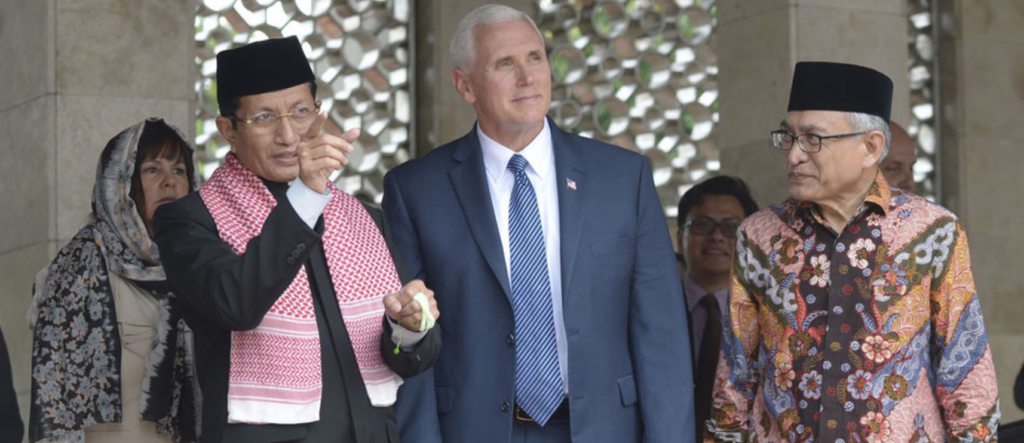
U.S. Vice President Mike Pence praised Indonesia’s democracy and moderate form of Islam on Thursday alongside the president of the world’s most populous Muslim nation, reinforcing his message with a visit to the region’s largest mosque. Pence’s comments, though routine, had significance for Indonesian President Joko “Jokowi” Widodo, who a day earlier suffered a serious political setback when a political ally was defeated by Islamic conservatives in the election for Jakarta governor. The divisive campaign undermined the image of Indonesia abroad as a generally tolerant Muslim nation. Indonesia is the latest stop on an Asian tour by Pence that aims to reaffirm traditional U.S. alliances at a time when Donald Trump‘s presidency has raised questions about the strength of the U.S. commitment to the region. Pence said at a joint news conference with Jokowi that the U.S. wants to strengthen its strategic partnership with Indonesia. In brief comments, Jokowi said they agreed to boost cooperation. The vice president praised Indonesia for its moderate form of Islam and said the two countries would continue to cooperate on combating terrorism. “As the second- and third-largest democracies in the world, our two countries share many common values including freedom, the rule of law, human rights and religious diversity,” Pence said. “The United States is proud to partner with Indonesia. It promotes and protects these values.” The vice president added: “Indonesia’s tradition of moderate Islam frankly is an inspiration to the world and we commend you and your people. In your nation as in mine, religion unifies, it doesn’t divide.” Pence said Trump would be attending a summit with the leaders of the Association of Southeast Asian Nations, or ASEAN, in the Philippines in November. But Pence foreshadowed some reworking of commercial and economic ties, saying that the U.S. seeks a free and fair relationship that helps job creation and economic growth for both sides. He said that U.S. exporters should face a level playing field and the relationship should be “win-win.” Trump assailed the Trans-Pacific Partnership trade deal during his 2016 campaign and announced shortly after his inauguration that the U.S. would withdraw from the Pacific Rim-based TPP, which now includes 11 countries from Chile to New Zealand. Pence has sought to reassure allies in the region that the U.S. is still committed to trade and economic ties despite Trump’s decision on TPP. Indonesia is on Trump’s trade hit list of nations that he considers the U.S. is losing out to in trade, and U.S. company Freeport-McMoran Inc., which operates the world’s largest copper mine in the Indonesian province of Papua, is in a protracted dispute with the Indonesian government. Trump’s company, the Trump Organization, is active in Indonesia with plans to manage luxury resorts being built near the capital Jakarta and on the tourist island of Bali. Trump’s Indonesian business partner, billionaire Hary Tanoe, is an aspiring politician who has said he might run for president in 2019. Pence’s first engagement in Indonesia was morning tea with Jokowi at the presidential palace. He and his family later visited the Istiqlal Mosque, the largest in Southeast Asia. The Pences removed their shoes at the entrance and his wife, Karen, and two daughters covered their heads with scarves. They walked inside the large prayer hall, observing the soaring dome, and also stopped at an open terrace in the mosque. Pence later sat with several faith leaders in a conference room where a speaker gave Pence an overview of the mosque’s history. The mosque, which can accommodate up to 200,000 people, was designed by a Protestant and sits near a Catholic cathedral in central Jakarta. The message and images sought to address questions in the Muslim world about Trump after his push for travel bans that would temporarily suspend visas from six predominantly-Muslim countries and halt the U.S. refugee program. Two judges have blocked the ban, prompting the Trump administration to appeal. Trump’s executive order does not include Indonesia, but the country is home to nearly 14,000 refugees seeking resettlement in third countries and activists have said the ban would affect their ability of entering the U.S. Republished with permission of The Associated Press.
How communities shaped by refugees became Donald Trump country
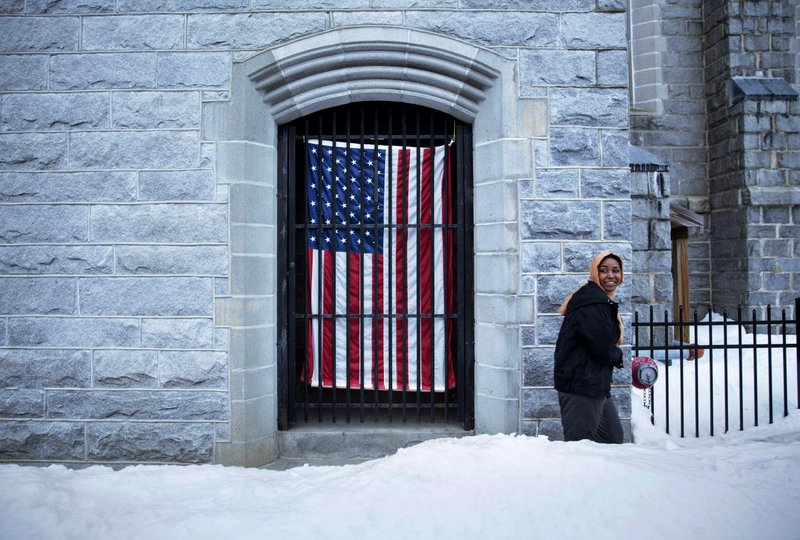
Richard Rodrigue stood in the back of a banquet hall, watching his blond-haired, blue-eyed daughter mingle among her high school classmates. These teenagers speak dozens of languages, and hail from a dozen African nations. They fled brutal civil war, famine, oppressive regimes to find themselves here, at an ordinary high school pre-prom fete in this once-dying New England mill town, revived by an influx of some 7,500 immigrants over the last 16 years. Rodrigue smiled and waved at his daughter, proud she is a part of it: “It will help her in life,” he said. “The world is not all white.” Rodrigue believes the refugees resuscitated his town — plugging the population drain that had threatened to cripple it, opening shops and restaurants in boarded-up storefronts. But he also agrees with Donald Trump that there should be no more of them, at least not now. America is struggling, he says, and needs to take care of its own before it takes care of anyone else. His working-class community, built along the banks of the Androscoggin River in the whitest state in America, is a place that some point to as proof that refugee integration can work. And yet for the first time in 30 years, voters in Androscoggin County chose a Republican for president, endorsing Trump’s nativist zeal against the very sort of immigrants who share their streets and their schools. Rodrigue knows he was born on the winning end of the American dream. His grandfather fled poverty in Quebec and moved to Maine to toil his whole life in the textile mills. He never learned English, faced hate and discrimination. Two generations later, Rodrigue owns a successful security company, lives in a tidy house in a quiet neighborhood and makes plans to send his daughter to college. Immigration worked for him. But it feels different today, as the county of 107,000 people tries to find its footing. The sprawling brick mills that line the river sit mostly shuttered. A quarter of children grow up poor. Taxpayers pick up the welfare tab. So Trump’s supporters here tie their embrace of his immigration clampdown to their economic anxieties, and their belief that the newcomers are taking more than they have earned. “There’s got to be a point in time when you have to say, ‘Whoa, let’s get the working people back up. Let’s bring the money in.’ But they keep coming, keep coming,” Rodrigue said. His community has been an experiment in immigration and all that comes with it — friendships, fear, triumphs, setbacks — and he knows that Trump’s presidency marks another chapter in that struggle for the American soul. “I guess it just boils down to: What’s enough? Is that wrong? Am I wrong? Am I bad? That’s how I feel.” ___ No one invited the Somali refugees to Lewiston. They fled bullets and warlords to eventually be chosen for resettlement in big American cities, where they were unnerved by the crime and drugs and noise. In early 2001, a few refugee families struggling to afford housing in Portland ventured 30 miles north and found a city in retreat. Empty downtown stores were ringed by sagging apartment buildings no longer needed to house workers because so few workers remained. The refugees saw possibility in Lewiston’s decay. Word spread quickly, and friends and families followed. The town morphed in a matter of months into a laboratory for what happens when culture suddenly shifts. Maine’s population is 94 percent white, and its citizens were abruptly confronted with hundreds of black Muslims, traumatized by war and barely able to speak English. Ardo Mohamed came to Lewiston in 2001. She fled Mogadishu in the 1990s, when militiamen burst into the home she shared with her parents and nine siblings, and started shooting. She watched her father die, as the rest of the family escaped into the woods. They wound up in overcrowded refugee camps, separated for years, then finally Atlanta, then Lewiston. Now she fries sambusas with her sister at a shop she owns downtown. “We wanted to be safe,” said the mother of five, “just like you do.” When the refugees began arriving, Tabitha Beauchesne was a student at Lewiston High School. Her new classmates were poor, but Beauchesne was poor, too. She grew up in a struggling family in housing projects downtown. It felt to her then, and it still feels to her now, that the refugees got more help than her family. “They just seemed to take over,” she said. She doesn’t consider herself racist, though acknowledges that race and religion likely play a role in her sense that the refugees overwhelmed her community. The African Muslims, many of whom wear hijabs, stand out far more than her French-Canadian ancestors did when they arrived generations ago, she said. That perception — one of being inundated by a culture so different from her own — ingrained in her a sense of injustice so deep it persists to this day. She’s now a stay-at-home mother of two, and she left Lewiston to move to another school district in the county because she believes the refugee students monopolize teachers’ attention. Once a Barack Obama supporter, Beauchesne turned to Trump — and she cheers his efforts to curb the flow of refugees into the United States. She wants Trump to design a tax system that funnels less of her money to aiding those from other countries. “I just don’t like giving money away that’s not benefiting me and, not to sound selfish, but then seeing it benefit other people,” she said. “As a business owner, my husband wouldn’t donate $500 to the Salvation Army if we couldn’t afford it. Our country needs to do the same thing.” Taxpayers do help refugee families. Maine offers a welfare program called General Assistance, a combination of state and city funds, which provides impoverished people with vouchers for rent, utilities and food. In 2002, at the beginning of the immigrant influx, the city handed out about $343,000
Counting Americans: A new Mideast box on census is sensitive

Zahraa Ballout isn’t “white,” and she certainly isn’t “some other race.” If the government gives her the choice of checking a new “Middle East/North Africa” box on a census form, would she? Yes, she says, despite some reservations about what it would mean to stand out after Americans elected a president who wants to ban travel from some countries in the region and has spoken favorably of registering Muslims in the U.S. “I would feel some wariness because you don’t know exactly the consequences or what’s coming next after you check the box,” says 21-year-old Ballout, a student in Dearborn, Michigan, who’s been in the country three years. “I don’t want to fool myself to think that checking another box (other than the new one) is going to protect me in some way.” Ballou’s risk-benefit analysis reflects a new caution surrounding the way the U.S. government counts Americans, an every-decade exercise mandated in the Constitution that influences the nation’s day-to-day operations in ways big and small. That includes representation in Congress and how taxpayer money is doled out – for education, public health, transportation and more. The Census Bureau on Feb. 28 for the first time recommended including the new category, which would mostly affect Muslims. The Office of Management and Budget is expected to make the decision later this year. The move is the product of years of research and decades of advocacy for Arab and other groups from the region that pre-date Donald Trump‘s presidential campaign. The Census Bureau said that when it tested a new MENA category in 2015, people of Middle Eastern or North African descent tended to check off that box. When it wasn’t there, they’d select “white” or, increasingly, “some other race.” Including the separate category, the agency said, is “optimal” to get a more accurate count of Americans. “There’s nothing for me to hide,” said Hussein Dabajeh, 30, a lifelong Dearborn resident who said his ancestors arrived from what’s now Lebanon in 1911. Dabajeh says he’d check the MENA box. “I can be American of Arab descent without being un-American.” The disparity can be seen in a basic statistic. The Arab American Institute estimates as many as 3.7 million people in the United States have Arab roots. The Census Bureau estimates there are 1.8 million Arab Americans in the U.S, according to data it has collected. Among other things, that means there are no accurate national numbers to provide clues to whether certain medical ailments are – as suspected – unusually common in people of that background, experts say. Both tallies show explosive growth in that population since 2000. And both support the new box on the 2020 census that would represent people with backgrounds from 19 countries in the region. But singling oneself out in that way has become sensitive at a time when Trump has linked a crackdown on Muslims with better national security. As a candidate, he called for a “total and complete shutdown of Muslims entering the United States.” As president, Trump has twice ordered travel bans on people from certain majority-Muslim nations. Federal courts have blocked those orders, but on Friday, the Trump administration said it would appeal the latest ruling. In 2016, Trump said the government should investigate mosques in the U.S. in much the same way the New York Police Department’s now-shuttered “Demographics Unit” spied on Muslims with help from the CIA. The group assembled databases on where Muslims lived, shopped, worked and prayed, infiltrated Muslim student groups, put informants in mosques and monitored sermons, The Associated Press reported in 2011. “The fear is legitimate. It’s something I worry about,” said Maya Berry, executive director of the Arab American Institute, which has been pushing for the change since before the 1990 census, when it put up posters reading, “We want to be counted, do you?” “It’s very hard for us now to sort of reject that wholly, because we’ve been working on it for decades,” she adds. “We’ve been telling our members: We understand why you’re concerned, it’s a legitimate concern. Let’s just proceed with caution.” Former Census director Robert Groves traces the worries in part to one “black mark” on the department’s history. During World War II, the Census Bureau provided the government with neighborhood information to help it sweep up 120,000 people of Japanese descent for imprisonment, under an order by President Franklin D. Roosevelt. But he points out that the law prohibits workers from disclosing personal census information. “The culture of the Census Bureau and this law has been successful over successive decades in allowing me and others to say this is the best protection that can be given to people,” said Groves, now provost of Georgetown University. While some members of the MENA community share the concerns, they also believe the government is powerful enough to discriminate against anyone. “There are better ways to do that than the census,” said Germine Awad, a University of Texas psychologist born in Egypt but raised in the United States. “That could happen at any moment.” Republished with permission of The Associated Press.
Joe Henderson: Just imagine huge can of worms religious liberty bill opens

The Hillsborough County, Florida public school district has straightforward rules in its student handbook about religion. It says students can talk about religion, practice their religion, can be excused to observe a religious holiday, and – most important for the context of our discussion today – decide for themselves whether they want to participate in things such as student-led prayer or other practices. The basic rule is this: If students lead the religious activity – fine. If teachers or administrators take part – not fine. Districts in Miami-Dade and Orlando have basically the same policy. Apparently, that’s not good enough for the state Senate Education Committee, which Monday approved SB-436. It’s a measure designed to protect religious liberty, except that such liberty already exists. The 5-2 vote was along party lines, of course; five Republicans said yea, two Democrats were naysayers. A statement released by Senate President Joe Negron after the education committee did its work, was a clear indication of what he has in mind. The statement said: “Freedom of Religion is a central right protected by our Constitution. This legislation makes it clear that the State of Florida stands for religious liberty and will take the steps necessary to protect the free speech rights of public school students, parents, teachers and school administrators.” A statement released by state Sen. Dennis Baxley was even more to the point. “We should be encouraging, rather than preventing our students from expressing their religious convictions,” Baxley said. “This legislation safeguards Freedom of Religion by protecting our students from being discriminated against based on the free expression of their religious ideals in spoken word or prayer, attire, school assignments and extracurricular activities.” I can see worms crawling out of that just-opened can by the thousands – assuming this bill passes. Let’s play a game called “just imagine.” Just imagine the bill passes and a teacher or administrator decides freedom of speech includes preaching the gospel in class or over the school public address system. What gospel would that be? What happens when a Muslim student takes offense and demands classroom time to offer prayers to Allah along with equal time at the microphone? Just imagine a Jewish kid goes, “Hey, wait a minute …” Let’s get really absurd and just imagine a Satanist wants the same freedom. Can’t happen, you say? It already has – in 2014 at the state capitol, not far from where this current bill was being fast-tracked through committee. Satanists demanded to erect their own holiday display to counter a Nativity scene by a Christian group. So why do this at all? It seems like obvious pandering to me. There is nothing already on the books that says kids and teachers can’t pray in public schools. I imagine many of them already do as the SAT tests are passed out. They can read the Bible during breaks. I have heard from parents, though, who say that even these student-led actions can put a lot of pressure on their kids to conform. Don’t believe it? Try sitting out a “voluntary” public prayer sometime and see the looks you get. But they’re going ahead with this bill and I wouldn’t be shocked if it became law – at least until it is overturned in the courts. This has been touted as bill that will protect Christians from alleged persecution. Baloney. Real persecution is what Christians face in places like Cuba, China and many Middle East nations. Real persecution is being dragged from your home and flogged or executed for your belief. The stuff these lawmakers are talking about doesn’t qualify. ___ Joe Henderson has had a 45-year career in newspapers, including the last nearly 42 years at The Tampa Tribune. He has covered a large variety of things, primarily in sports but also hard news. The two intertwined in the decade-long search to bring Major League Baseball to the area. Henderson was also City Hall reporter for two years and covered all sides of the sales tax issue that ultimately led to the construction of Raymond James Stadium. He served as a full-time sports columnist for about 10 years before moving to the metro news columnist for the last 4 ½ years. Henderson has numerous local, state and national writing awards. He has been married to his wife, Elaine, for nearly 35 years and has two grown sons — Ben and Patrick.
Donald Trump says White House ‘fine-tuned machine,’ despite turmoil

Donald Trump mounted an aggressive defense of his young presidency Thursday, lambasting reports that his campaign advisers had inappropriate contact with Russian officials and vowing to crack down on the leaking of classified information. Nearly a month into his presidency, Trump insisted in a freewheeling White House news conference that his new administration had made “significant progress” and took credit for an optimistic business climate and a rising stock market. The president denounced media reports of a chaotic start to his administration marked by his contentious executive order — rejected by a federal appeals court — to place a ban on travelers from seven predominantly Muslim nations. Trump said he would announce a “new and very comprehensive order to protect our people” next week. “This administration is running like a fine-tuned machine,” Trump declared in a lengthy news conference that saw the new commander in chief repeatedly interrupting reporters’ questions and airing his grievances. Throughout the encounter the new president delivered recurring criticism of the news media, accusing it of being “out of control” and promising to take his message “straight to the people.” He dismissed recent reports in The New York Times and on CNN that Trump campaign aides had been in contact with Russian officials before his election. Trump called Paul Manafort, his former campaign manager who has ties to Ukraine and Russia, a “respected man.” Pressed repeatedly, Trump said that “nobody that I know of” on his campaign staff had contacted Russian officials. He called such reports a “ruse” and said he had “nothing to do with Russia.” Trump added, “Russia is fake news. This is fake news put out by the media.” Amid reports of widespread leaks within his administration, Trump also warned that he would clamp down on the dissemination of sensitive information, saying he had asked the Justice Department to investigate. “Those are criminal leaks,” adding, “The leaks are real. The news is fake.” He blamed any problems on the outgoing Obama administration. “I inherited a mess at home and abroad — a mess,” Trump said. The president announced that Alexander Acosta, the dean of the Florida International University law school, would be his nominee for Labor secretary. That came a day after fast-food executive Andrew Puzder withdrew his nomination for Labor after losing support among Republican senators. Trump, a reality television star and real estate mogul who was elected as an outsider intent on change, said his ousted national security adviser, Michael Flynn, was “just doing his job” in talking with Russian officials before the inauguration. But he said he was “not happy” with how Flynn described his phone call with a Russian diplomat to Vice President Mike Pence. Trump knew for weeks that Flynn had misled Pence but did not inform the vice president, according to a timeline of events supplied by the White House. Trump said he had identified a strong replacement for Flynn, which made the decision to let him go easier. Trump is said to favor Vice Admiral Robert Harward, a former Navy SEAL, as his next national security adviser, according to a White House official. Harward met with top White House officials last week and has the backing of Defense Secretary Jim Mattis. He was meeting with officials later Thursday. Addressing immigration, one of the biggest issues of the past campaign, Trump said it was difficult dealing with the policy known as DACA, which allows young adults to get work permits and Social Security numbers and protects them from deportation. Referring to the Deferred Action for Childhood Arrivals rule, he said he would “deal with DACA with heart.” While Trump has promised to halt illegal immigration as a cornerstone of his administration, he has also promised to focus on people who have committed crimes. He said he had the “best lawyers” working on the policy now and the “new executive order is being tailored to the decision we got from the court.” Earlier in the day, Trump had a breakfast meeting with some of his staunchest House supporters. The White House has said Trump asked for Flynn’s resignation because he had misled Vice President Mike Pence over his dealings with Russia and whether he had discussed sanctions with Russia’s ambassador to the U.S. before Trump’s Jan. 20 inauguration. Flynn previously had denied those conversations to Pence and other top officials. On Thursday, he warned in a pair of tweets that “lowlife leakers” of classified information will be caught. As journalists were being escorted out of the breakfast meeting, Trump responded to a reporter’s question on the subject by saying: “We’re going to find the leakers” and “they’re going to pay a big price.” Republished with permission of The Associated Press.
From protests to ‘pussy hats,’ Donald Trump resistance brews online
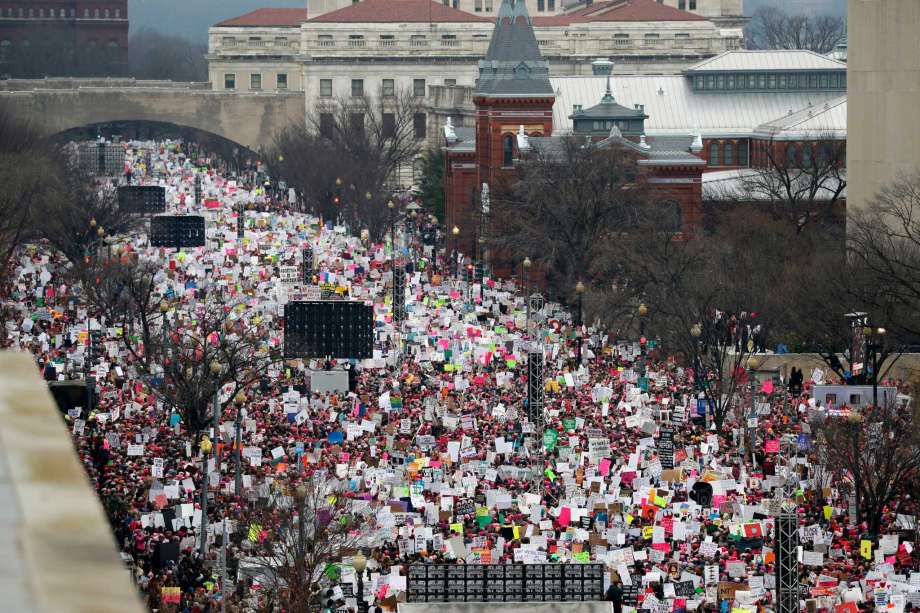
The revolution may not be televised — but it apparently will be tweeted. And Facebooked. And Instagrammed. Not long after President Donald Trump temporarily barred most people from seven majority-Muslim countries from entering the U.S., social activist Dex Torricke-Barton took to Facebook. “I’m thinking of organizing a rally,” he posted. Within a few hours, more than 1,000 people expressed interest. The resulting protest a week later, in front of San Francisco’s City Hall, drew thousands more. Torricke-Barton is far from alone. From organizing protests on the fly to raising money for refugee and immigrant rights groups, people have been using social media to fuel the resistance against Trump in ways their organizing predecessors from the 1960s could have hardly imagined. ROOTS OF PROTEST In Queens, New York, for instance, a group of 27 women met up to write postcards to their state and local representatives during a “Postcard-Writing Happy Hour” organized through Facebook. And on Ravelry, the social network for knitters and crocheters, members have been trading advice and knitting patterns for the pink “pussy hats” that emerged as a symbol during the Women’s March on Washington and similar protests elsewhere after Trump’s inauguration. “This is an incredible project because it’s mixed between digital and physical,” says Jayna Zweiman, one of the founders of the Pussyhat Project. “We harnessed social media for good.” In 1969, activists planned massive marches around the U.S. to protests the war in Vietnam. The protests, called the Moratorium, drew millions of people around the world. But “it took months, a lot of effort, a national office of the organization to get it off the ground,” says Christopher Huff, a Beacon College professor focused on social movements of the 1960s. “The women’s march was achieved at a much larger scale at a fraction of the time.” This immediacy is both an asset and a disadvantage. While online networks help people rally quickly around a cause, Huff says, they don’t necessarily help people grasp the “long-term effort” required to sustain a movement. ONLINE, THEN OFF In Silicon Valley and across the tech world, Trump’s travel ban created a stir that went well beyond the industry’s usual calls for deregulation and more coding classes for kids. Between aggregating donations, issuing fiery statements, and walking out of work in protest, tech company executives and employees took up the anti-Trump cause at a scale not seen in other industries. New York-based Meetup, for instance, broke with nearly 15 years of helping people form and join interest groups on a non-partisan basis. “We’re vital plumbing for democracy,” the company wrote in a Medium post this week. “But after Donald Trump’s order to block people on the basis of nationality and religion, a line had been crossed.” So Meetup held a company-wide “resist-a-thon” — a riff on the hackathons tech companies hold to devise new technologies — to help people get involved in the anti-Trump movement known as “the resistance.” It then unveiled more than 1,000 new “#resist” Meetup groups that people can join for free (it’s normally $15 a month to run a group). As of Wednesday, some 35,000 people had joined the #resist Meetup groups, and scheduled 625 events around the world. Torricke-Barton, who in earlier incarnations wrote speeches for Facebook CEO Mark Zuckerberg and Alphabet Chairman Eric Schmidt, said he and two sisters of Iranian descent organized their last-minute protest using Facebook groups and Messenger. That’s quite a contrast with Torricke-Barton’s earlier experience protesting violence in Darfur more than a decade ago. Back then, “lawyers, marketers, communications people would help you get (the protests) off the ground … networks had to be created in advance,” he said. “Now, protests can start without any kind of infrastructure.” FOLLOW THE MONEY Shortly after Trump’s order, the venture capitalist Bijan Sabet tweeted a link to the fundraising platform Crowdrise alongside an explanation of his support for the American Civil Liberties Union— and then asked his followers to do the same. Sabet figured it might take as long as two months to reach his $50,000 goal. It took three days. That weekend, the ACLU raised $24 million, far more than the $4 million it receives in a typical year. Sabet, whose father is from Iran, says he’s seeing civic involvement “level up,” and that social media is pushing that along. Previously, he said, people would maybe say, “yeah, I’m a bit frustrated, but I don’t have all the information, I don’t know how to get involved.” Now, there’s no excuse. LITTLE THINGS The effects of social media aren’t limited to huge efforts. A week or so after the election, Marisa Frantz, an art director in Cerrillos, New Mexico, created a private Facebook group called “America is Watching.” To join, all people had to do was comment “yes.” If they then posted their zip code in comments, Frantz would send them contact information for their senators and representative, Frantz’s sister-in-law, Sarah Bailey Hogarty, explained in an email. “Like many of us, I was floundering around feeling terrible and afraid,” said Hogarty, a digital producer for the San Francisco Museum of Modern Art. “I wanted to do something, but I had no idea where to start.” Hogarty called the group her “foothold to resistance.” Now, the group has more than 1,000 members across the U.S. and organizes weekly “calls to action,” such as contacting senators and representatives about a particular issue determined by a poll of the group. Groups like this demonstrate how social media has helped “lower the barrier to entry” into social activism, in the words of Tarun Banerjee, a sociology professor at the University of Pittsburgh. “What social media can do really well is spread awareness,” Banerjee said. “Can people make President Trump back down because of social media? Probably not. But it can shine the light.” Republished with permission of the Associated Press.
Federal government seeks stay of immigration order

The Latest on a lawsuit by Washington and Minnesota seeking to halt President Donald Trump’s immigration ban (all times local): 7: 20 p.m. The White House says it will seek an emergency stay of a federal judge’s order that temporarily blocked President Donald Trump’s ban on people from seven predominantly Muslim countries. White House spokesman Sean Spicer said Trump’s executive order issued last week was “lawful and appropriate.” An initial statement said the judge’s order was “outrageous,” but it was later revised to remove that word. U.S. District Judge James Robart late Friday granted a temporary restraining order at the request of Washington state and Minnesota that’s effective nationwide. Washington Attorney General Bob Ferguson had said that Trump’s order is causing significant harm to residents and effectively mandates discrimination. Minnesota joined the suit this week. ___ 5:49 p.m. Minnesota Attorney General Lori Swanson says she supports measures to protect the security of the United States but also backs the Constitution. Swanson, a member of the Minnesota Democratic-Farmer-Labor Party, is reacting to a federal court ruling temporarily blocking President Donald Trump’s travel ban. She said in a statement Friday that she supports “strong measures to protect the security of the United States” but also supports “the bedrock of that security — namely, the Constitution of the United States.” U.S. District Judge James Robart granted a temporary restraining order Friday that Washington state and Minnesota requested. It halts Trump’s executive order banning travelers from seven predominantly Muslim countries and suspending the U.S. refugee program. ___ 4:35 p.m. Washington state’s attorney general says a federal court ruling temporarily blocking President Donald Trump’s travel ban shows nobody is above the law. U.S. District Judge James Robart granted a temporary restraining order Friday that Washington state and Minnesota requested. It halts Trump’s executive order banning travelers from seven predominantly Muslim countries and suspending the U.S. refugee program. Washington Attorney General Bob Ferguson said after the ruling that “the law is a powerful thing — it has the ability to hold everybody accountable to it, and that includes the president of the United States.” Ferguson said people from the affected countries can now apply for entry to the United States. The U.S. Department of Homeland Security had no immediate comment on the ruling. ___ 3:55 p.m. A federal judge in Seattle has temporarily blocked President Donald Trump’s ban on people from seven predominantly Muslim countries. U.S. District Judge James Robart granted a temporary restraining order Friday at the request of Washington state and Minnesota that’s effective nationwide. Trump signed an executive order last week that sparked protests across the country and confusion at airports as some travelers were detained. Lawyers for the U.S. government argued that the states don’t have standing to challenge the order and said Congress gave the president authority to make decisions on national security and admitting immigrants. Washington Attorney General Bob Ferguson had sued, saying the order is causing significant harm to residents and effectively mandates discrimination. Minnesota joined the suit this week. ___ 7:58 a.m. Washington state and Minnesota officials are asking a federal judge for an immediate nationwide halt to the implementation of portions of President Donald Trump’s immigration travel ban. Washington Attorney General Bob Ferguson says the state has a “profound interest” in protecting its citizens from the harms caused by what he called “the irrational discrimination” embodied in Trump’s order. A hearing is scheduled for Friday afternoon. Trump issued an executive order last week prohibiting people from seven predominantly Muslim countries from crossing U.S. borders. Washington and Minnesota want a temporary restraining order while the court considers their lawsuit, which says key sections of the order are unconstitutional. Ferguson says the order is causing significant harm to Washington residents and businesses. The Washington-based businesses of Amazon, Expedia and Microsoft support the state’s efforts to stop the order. Republished with permission of The Associated Press.
Conservative Kochs condemn Donald Trump’s immigration crackdown
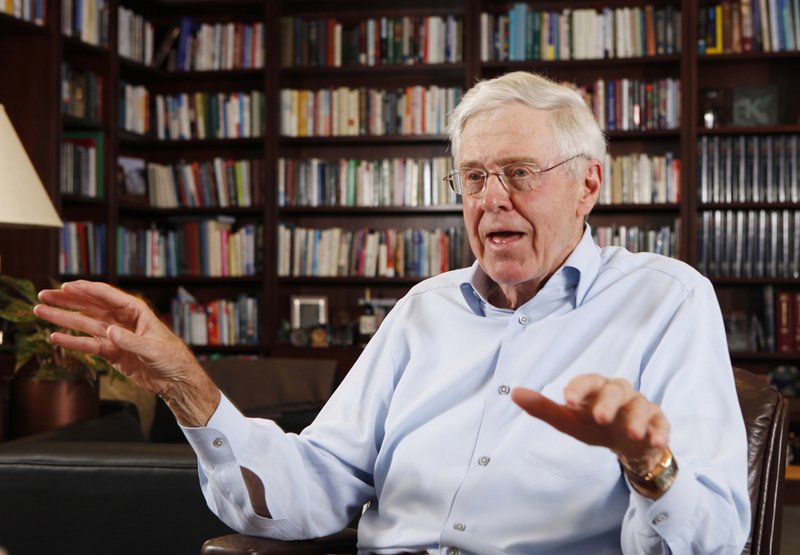
Charles Koch first likened candidate Donald Trump‘s plan to ban Muslim immigrants to something Adolf Hitler would have done in Nazi Germany. The billionaire industrialist and his chief lieutenants offered a more delicate response this weekend when asked about President Trump’s plan to block immigration from seven Muslim-majority countries. They described Trump’s plan as “the wrong approach” that violated its dedication to “free and open societies.” The criticism comes as the Koch network, among the most powerful conservative groups in the nation, works to strike a delicate balance in the early days of the new administration. The Kochs refused to support Trump’s candidacy last fall, but they now see a once-in-a-lifetime opportunity to influence the White House and the Republican-controlled Congress. Their optimism is fueled by strong relationships inside the administration, despite their vow to oppose Trump’s policies if they deviate from the Koch brothers’ conservative priorities. Trump critics were easy to find at the California desert resort this weekend, where attendance at a semi-annual conference was limited to the 550 people who donate at least $100,000 each year to the various conservative political and policy groups backed by Charles and David Koch. The critics included Charles Koch himself, although the conservative patriarch did not mention Trump by name Sunday as he warned that the nation is facing a moment of “tremendous danger.” He said the nation could “go the authoritarian route … or we can move toward a free and open society. So this is our opportunity.” Still, the Koch network says it’s confident about its ability to shape the direction of the Trump administration’s policies from the inside. “Many former network staffers that are in the White House now remain good friends of ours. So we’re in constant contact with them,” said Koch spokesman James Davis. “Conversations have been open and continue to be.” There is perhaps no bigger Koch ally than Vice President Mike Pence, whose staff and ideology has been in close alignment with the Kochs for years. Charles Koch spoke directly with the vice president on the phone days before his inauguration as Pence considered hiring a Koch communications staffer, Stephen Ford, to serve as his chief speechwriter. Ford was soon hired, along with former Koch chief Marc Short, who now serves as the White House legislative director. “The reason we’re optimistic … is really Mike Pence,” said Doug Deason, a prominent Trump supporter and major Koch donor. “If you think Cheney had power in Bush White House, just watch and see what happens with Mike Pence.” Several reporters, including one from The Associated Press, were invited to attend the weekend conference. As a condition of attending, photographers were not allowed and reporters were not permitted to identify any donors without their permission. Koch and his powerful allies insist they will challenge Trump when his policies don’t align with their conservative vision. The network plans to spend between $300 million and $400 million over the next two years to shape policy and politics, much of it devoted to its nationwide grassroots network. While there has been much talk of Trump allies creating an outside group to help promote his agenda, the Koch network’s capacity to communicate directly with voters on the ground in key states has no political rival. The Koch’s “secret sauce,” Holden says, is “the accountability play.” “We’re principled. And if we can’t get comfortable with the policies that are in place, then we’re not going to support them. But if we can we will support them, regardless of who’s in office,” he said. Like Trump, the Kochs favor efforts to cut government regulation and replace the federal health-care system. They do not share the president’s plans for a massive infrastructure spending or his crackdown on immigrants from Muslim-majority countries. “The travel ban is the wrong approach and will likely be counterproductive,” network co-chair Brian Hooks said Sunday. “Our country has benefited tremendously from a history of welcoming people from all cultures and backgrounds,” he said. “This is a hallmark of free and open societies.” Republished with permission of The Associated Press.
Martin Dyckman: By electing pro-gun politicians, we are allies of home-grown terrorists

What fools we are. What willful, stubborn, persistent, incurable fools. Americans submit by the millions to the Transportation Security Administration’s multiple indignities and inconveniences. The TSA will cost us $5.1 billion this year. We’ll fill its trash barrels with tons of cosmetics, lotions and bottled water that we can’t carry on board. This is in the hope of preventing terrorists from committing more mass murders, such as those of September 11, 2001. And there haven’t been any more in that manner. But that guards only one gate, while leaving another gaping. Even as you next pose like a prisoner with arms raised or stand still for a TSA officer to wand you, some terrorist with massacre in mind could be walking into any gun shop and walking out with the means to carry it out. That’s what Omar Mateen did last week in Florida, where no permit is needed to buy or possess any firearm other than a machine gun. Florida allows even an AR-15 or its equivalent. Such weapons were invented for use in war, not self-defense. They fire as rapidly as a finger can pull a trigger. With a technique called bump fire, a trained shooter supposedly can achieve a rate of 700 rounds per minute. And so Florida is now the site of America’s worst mass shooting, with 49 innocent people dead and 53 others wounded, many grievously, at an Orlando night club named Pulse. Mateen appears to have been the most dangerous type of terrorist — homegrown, out of sight of any border control, virtually undetectable. And yet, there were warnings. His employer, a British-based security firm whose clients include the U.S. government, reportedly was told, according to The New York Times, that he spoke racial, ethnic and sexist slurs and talked about killing people. The FBI looked into him twice. Whether there was negligence is an appropriate question for investigation. The bigger question, though, is how many more Americans must die en masse, in nightclubs and restaurants and movie theaters and churches and schools, in as few seconds as it takes to read the sentence, before we learn to prohibit the sale and possession of such weapons of mass destruction? How many more terrorists will we arm? Predictably, of course, Donald Trump right away scapegoated the entire Muslim community, asserting without a shred of evidence that someone must have known what Mateen intended. In fact, most of the victims of mass shootings in the United States — 621 dead, 594 injured since 1982, according to Mother Jones — were killed by non-Muslims. Do we blame Christianity for Charleston, Virginia Tech, or for Newtown, Aurora, and Columbine? Or for the bombings and shootings, some fatal, at abortion clinics? Radicalism exists in nearly every religious faith and is the enemy of them all. Right after the San Bernardino massacre, the Senate voted 45-54 against prohibiting persons on the terrorism watch list from buying firearms. If the list is faulty, as some senators objected, it should be fixed. But as of now, there can be no confidence that someone on that list won’t be the next mass murderer. We’ll hear the gun lobby, doubtlessly, argue yet again that the best defense — the only defense — against the consequences of its insane demands is for everyone to have guns everywhere. Now suppose that half the people in that crowded, dimly lighted club had weapons when the shooting began. Think about it. Many more than 49 innocent people would be dead. Even when highly trained police stormed the scene, they couldn’t be sure that Mateen would be the only fatality. Someone posted to Facebook the other day that the NRA is America’s ISIS. Not so. The NRA does not set out to massacre innocent people. But the NRA and its associates in the gun lobby are indeed the allies of ISIS and of every other terrorist individual or organization, whatever its roots, where hatred is harbored against Americans because of their faiths, their origins, their race, or their nationality, or where mental illness inspires inchoate rage. And we — you and I, fellow citizens, are also terrorism’s allies, however unwilling or unwitting me may believe we are. We are terrorism’s allies so long as we submit to electing people to public office who are so stupid, selfish and cowardly that they would rather enact the insanities of the gun lobby than take reasonable and necessary steps to avert mass murder. There is no sound reason why any private citizen needs semi-automatic weapons, especially not AR-15s. Their possession and sale should be criminalized, except perhaps for gun clubs where the weapons would not be allowed off the premises. For a fraction of what the TSA is costing, we could buy back every such weapon and pay the owners a bonus for their troubles. The Second Amendment, of which the Supreme Court and the gun lobby have such a distorted view, was written in an age when no firearm on earth could be discharged more than three or four times a minute. Time and technology have rendered the gun lobby’s interpretation functionally obsolete. How many more Americans must be slaughtered before we, and our politicians, face that fact? ___ Martin Dyckman is a retired associate editor of the newspaper now known as the Tampa Bay Times. He lives in Asheville, North Carolina.
Joe Biden to meet with leaders in Turkey mid-January
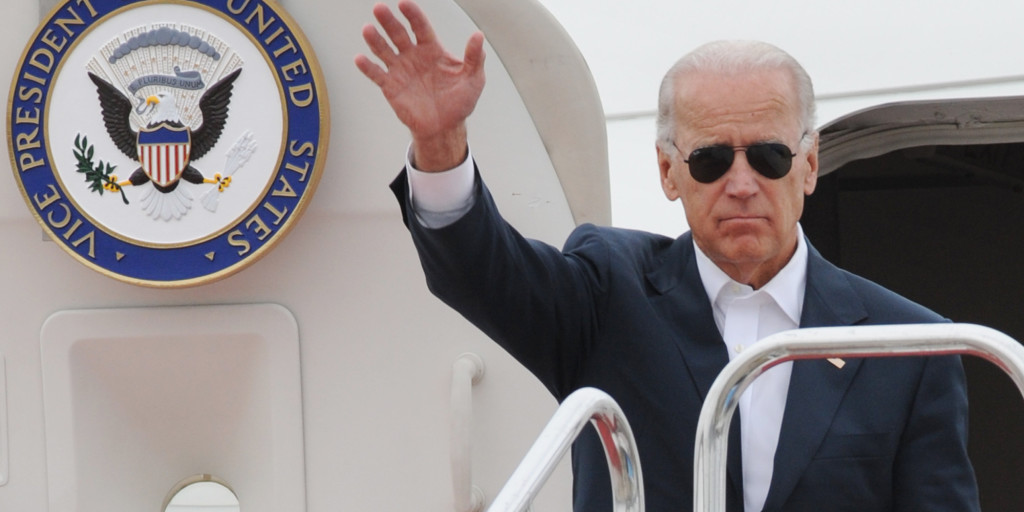
Vice President Joe Biden will travel to Turkey next month amid the ongoing fight against the Islamic State group. Biden is adding a stop in Turkey to his previously announced trip to Davos, Switzerland, for the World Economic Forum the week of Jan. 17. The White House says Biden will meet with Turkish President Recep Tayyip Erdogan (REH’-jehp TY’-ihp UR’-doh-wahn) and Prime Minister Ahmet Davutoglu (AH’-meht dah-voot-OH’-loo). The U.S. is pressing Turkey to do more to fight IS and tighten its border with Syria. Turkey has been a target of IS attacks, and on Wednesday detained two suspected IS militants believed to be planning suicide attacks. Biden is also working to tamp down a spat between Turkey and Iraq over Turkish troops staged at a training camp in northern Iraq. The White House says Biden will also visit Guatemala on Jan. 14 to lead the U.S. delegation to incoming President Jimmy Morales‘ inauguration. Republished with permission of the Associated Press.


